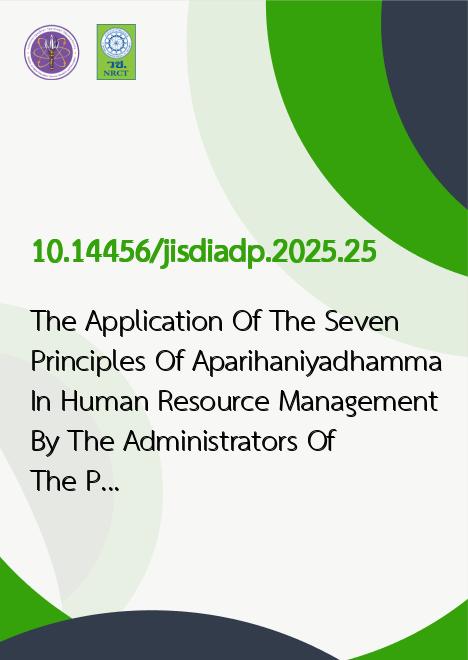
|
The Application Of The Seven Principles Of Aparihānīyadhammā In Human Resource Management By The Administrators Of The Phra Phiriyattitham School, General Education Department, Nong Khai Province |
|---|---|
| รหัสดีโอไอ | |
| Creator | Phramaha Athiwat Varacakko (Thongkhao) |
| Title | The Application Of The Seven Principles Of Aparihānīyadhammā In Human Resource Management By The Administrators Of The Phra Phiriyattitham School, General Education Department, Nong Khai Province |
| Contributor | Phrakru Jiradhammathat, Phramaha Paitool Siridhammo, Arithat Loesruamchok |
| Publisher | DR.KET INSTITUTE OF ACADEMIC DEVELOPMENT AND PROMOTION |
| Publication Year | 2568 |
| Journal Title | Journal of Interdisciplinary Social Development |
| Journal Vol. | 3 |
| Journal No. | 1 |
| Page no. | 379-395 |
| Keyword | Seven Principles of Aparihaniyadhamma, Personnel Management, Administrators, Pariyatti Dhamma Schools |
| URL Website | https://so12.tci-thaijo.org/index.php/JISDIADP/about |
| Website title | https://so12.tci-thaijo.org/index.php/JISDIADP/index |
| ISSN | 2822-1060 |
| Abstract | This research aims to: (1) study the seven principles of Aparihaniyadhamma in the scriptures of Theravāda Buddhism, (2) examine the personnel management practices of administrators in Pariyatti Dhamma Schools (General Education Division) in Nong Khai Province, and (3) explore the application of the seven principles of Aparihaniyadhamma in the personnel management of these administrators. This study is qualitative in nature, utilizing document analysis and interviews with 25 key informants. Data collection was conducted using structured interviews, and the findings were analyzed through comparative analysis to identify relationships between the data.The research findings indicate that1. The findings reveal that the seven principles of Aparihaniyadhamma serve as fundamental guidelines for maintaining stability in both secular and religious communities. These principles include regular meetings, unity in work, adherence to regulations, respect for elders, protection of dependents, preservation of cultural heritage, and upholding the teachings of the noble ones.2. The personnel management of Pariyatti Dhamma School administrators in Nong Khai Province emphasizes proper workforce planning, recruitment, and development of personnel, fostering a conducive working environment, fair performance evaluations, and discipline maintenance. These practices ensure effective administration and sustainable development of the schools.3. The application of the seven principles of Aparihaniyadhamma in personnel management contributes to a transparent and participatory administrative system. Key aspects include regular meetings, fair regulation enforcement, inclusive decision-making, cultural preservation, and continuous administrative improvement. These applications foster organizational unity, transparency in governance, and long-term educational quality development. |
